SAINT JOAN OF ARC
Domremy to Chinon
NATIVITY (1412)
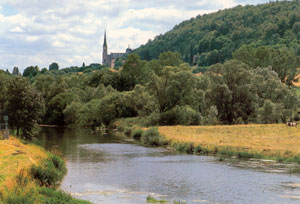
JOAN was born on January 6, 1412, in the village of Domremy, the village of “ Lord Remi ”, on the night of the Epiphany, the feast of the adoration of the Magi as well as of the anointing of Our Lord Jesus Christ at His baptism in the Jordan.
In the same way that the Nativity of Our Lord was surrounded by marvels, so, on the night of the Epiphany 1412, cocks were heard to crow before their usual hour, « like heralds of this glad news. They flapped their wings, and for almost two hours they seemed to be announcing the new event », testifies the Seneschal Perceval de Boulainvilliers, who organised the enquiry at Domremy, towards the end of March 1429, on the instructions of the Dauphin Charles.
After the miracles of the nativity came the ordinary events of the “ hidden life ” : « My mother taught me the Pater Noster, the Ave Maria and the Credo, and nobody other than my mother taught me my beliefs. »
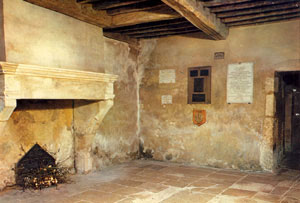
The witnesses are unanimous in singing the exceptional virtues of the young girl :
« A chaste, well-behaved girl, there was none better than her in the two villages » of Greux and Domremy.
In 1425, the village of Domremy experienced its massacre of the Holy Innocents, as in the times of King Herod. Henry d’Orly, known as the Bastard of Savoy, a gang leader came and pillaged Domremy and Greux. The peasants were forewarned and fled south as far as Neufchateau, a fief of the Duke of Lorraine, taking with them their meagre belongings and livestock... They remained at Neufchateau for only four or five days, until the armed bands left. » The villagers returned to find the burned remains of their roofs and houses, and the church of Saint Remi devastated. Now, the house of Jacques Darc, o miracle ! was intact. The mark of divine protection was clearly visible to everyone.
ANNUNCIATION (1424)
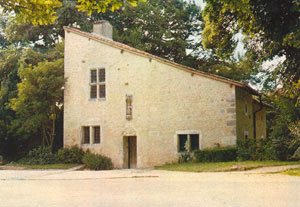
Joan had just turned twelve. She had been confirmed, had been receiving Holy Communion for a year and already fasted like an adult. She suddenly saw a luminous cloud by the side of the church. It was midday. From the cloud came a voice :
« Joan, you are to live a very different life and to accomplish astonishing deeds. For you are the one who has been chosen by the King of Heaven to accomplish the restoration of the Kingdom of France, and to bring aid and protection to the Dauphin Charles, expelled from his domain. You will wear the garb of a man. And taking up arms, you will be the chief-of-war. All things will be directed by your counsel. »
At that time, Saints Catherine and Margaret used to repeat to Joan, « two or three times a week that she should set out for France ».
VISITATION (1428)
Joan had a cousin by marriage, whom she called “ uncle ”. His name was Durand Laxart, and he had married Jeanne, the daughter of Aveline, the sister of Isabelle Romée. He was a husbandman at Burey-le-Petit, a one-and-a-half hour walk to the north, on the road to Vaucouleurs, the last fortified town to have remained faithful to the Dauphin Charles, in the midst of territories entirely won over to the Burgundian rebellion and occupied by English garrisons.
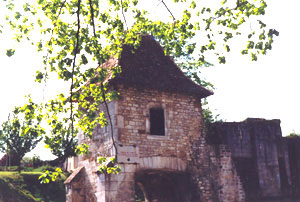
One day, Durand Laxart, who loved and admired his little cousin, so pure, so wise and so devout, came to ask Jacques and Isabelle if he could take her to his home for a few days in order to assist his wife who was expecting a child. Thus, one fine day in May Joan set out, just like the Virgin Mary left Nazareth « and went in all haste to a town in the hill country of Judah » in order to assist her cousin of whom the Angel had told her « that in her old age she had conceived a son. »
On the way, the Maid of Domremy revealed to her companion that « she wished to go to France, to the Dauphin, in order to have him crowned, and she told him : “ Was it not said in times past that France would be laid waste by a woman and that it would then be restored by a Maid ? ” »
One can imagine Durand’s surprise ! Now, he believed in Joan, and he decided to accompany her to Vaucouleurs and take her to Baudricourt.
On the day of the Lord’s Ascension, May 13, 1428, Durand and Joan entered the castle. There was nothing to distinguish Lord Robert from the peasants and soldiers; however, Joan went straight up to him, told him her name as well as those of her parents and her village, and then she said to him :
« I have come to you, my Lord Robert, on behalf of my Lord, that you would tell the Dauphin Charles to stand firm and not to engage in combat against his enemies, for my Lord will give him succour before mid-Lent. »
« The Kingdom does not concern the Dauphin, she continued, but it does concern my Lord. However, my Lord wants the Dauphin to be made king and for him to hold this kingdom in trust. The Dauphin will be king, despite his enemies, and I shall lead him to his consecration. »
« And who is your Lord ? asked Robert.
– The King of Heaven.
– Take her home to her father, and give her a good hiding ! » Baudricourt said to Durand.
The Maid remained another week with her cousin, and then returned to Domremy. But her Voices pressed her again :
« How long will you delay ? France is dying, her cities are being laid waste, the good are perishing, the nobility are being put to death, illustrious blood is being shed. »
Indeed, the English were completing their conquest. In northern France only Tournai, Vaucouleurs and Mont-Saint-Michel remain faithful to the Dauphin Charles. On October 12, 1428, a formidable English army appeared before Orleans; they had come to besiege and capture it, and then cross the Loire and invade southern France
THE PROMISE OF DELIVERANCE
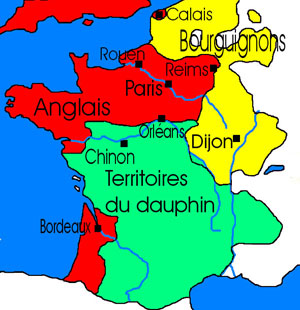
In December 1428, Durand Laxart came to collect Joan again for the churching of his spouse… and for the deliverance of the kingdom of France.
Joan thus left Domremy for a second time without informing her parents of anything.
Now, once the ceremony of “ churching" was over, Durand and Joan went to Vaucouleurs, where the young girl’s renown had begun to spread. A small group of young knights already believed in her mission and offered themselves to her service.
Jean de Metz promised that he would take her to the Dauphin, with God’s help. And as a pledge of faith, he touched her hand :
« When do you want to leave ?
– Rather today than tomorrow, and rather tomorrow than the day after.
– Will you go in these clothes ?
– I would prefer men’s clothing. »
He ordered a soldier to bring a man’s outfit with breeches. Henceforth Joan dressed herself in this soldier’s attire and had her hair cut short above the ears.
The city was in a turmoil of excitement. And opinion was divided. Was Joan, who could now be seen wearing a man’s attire, a genuine inspirée ? Baudricourt asked John Fournier, the parish priest of Vaucouleurs, to exorcise her. Dressed in a surplice and stole, escorted by his clerks, and carrying a ritual and holy water, the priest recited in Latin the prescribed prayers, then in French he addressed Joan who knelt before him : « If you are a wicked creature, withdraw from us, but if you are a good creature, approach us. » Then Joan advanced on her knees.
But then, in a more lively tone to Baudricourt and before everyone, she recalled the prophecy : « Have you not heard this prophecy, that France would be destroyed by a woman, and that she would be restored by a Maid from the Marches of Lorraine ? »
From that moment events gathered pace. But Joan did not want to leave without asking her parents’ forgiveness. She dictated a letter, which a messenger carried to Domremy.
As for Baudricourt, he had still not made a decision, and feelings began to run high. It was here, on February 12, that the disaster recently suffered by the French before a besieged Orleans was revealed to Joan. Deeply disturbed by the unnecessary shedding of French blood, she vigorously exhorted Baudricourt :
« In God’s Name, you have waited too long to send me; for today the noble Dauphin has suffered great harm near Orleans, and he will suffer yet more, if you do not send me to him soon. »
He would soon have news from France and would thus be in a position to determine whether Joan were a true prophetess or a base intriguer. A few days later, the royal messenger, Colet de Vienne, arrived at Vaucouleurs, bringing the captain news of the disaster. The French at Orleans, starving in the besieged city, had attempted, in a desperate and poorly organised sortie, to capture a convoy of provisions sent by Bedford to the besieging army. But they were defeated. This disaster sounded the death knell of the faithful city.
It would have taken the horseman about ten days to reach Vaucouleurs. Baudricourt now had the sign he was looking for : Joan had quite clearly been informed by divine inspiration.
A small enthusiastic crowd, filled with joy and with faith in God and His envoy, gathered at the foot of the castle. Joan left the fortress and mounted the horse with astonishing ease. Everyone had their eyes on her. Baudricourt approached and said to the young girl : « Go, and come what may ! » Joan turned to those in the escort and repeated what she had just said to the two knights : « In God’s Name, take me to the noble Dauphin, and be not afraid that either you or I shall be hindered. » It was dusk on Tuesday 22 February 1429.
UNDER THE WATCH OF ANGELS
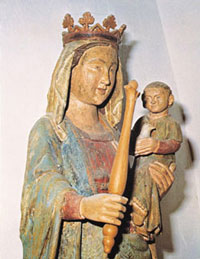
Colet de Vienne knew the indirect routes, the best times of day and night to avoid notice, as well as the halting places where one could spend the night. « Sometimes we travelled by night, recounts Jean de Metz, fearing lest the English and the Burgundians be in the vicinity. We remained on the road for eleven days, riding to reach the city of Chinon.
« During the journey, Bertrand and I lay down to sleep every night along with her. But this Maid lay down close to me wearing her doublet and breeches. I was so afraid of her that I would not have dared solicit her, and I declare on oath that I never had any desire in her regard nor any carnal movement. » Poulengy testified likewise, adding, to his honour and to that of the Maid : « on account of the goodness that I saw in her ».
« On the way, we had many anxieties, but Joan always told us to have no fear », he continues. « I was greatly fired up by her words, for it seemed to me that she had been sent by God. I never saw anything in her that was bad, but she was always so good a lass that one might have called her a saint. And thus, without any serious obstacles, we made our way to Chinon. »
Between Saint-Catherine and Bouchard Island, the Maid and her escort escaped one final ambush. Armed men had been sent by La Trémoille, Charles’ prime minister, to block the route of the small troupe. « But just when they had decided to go into action, they were rooted to the spot, and thus Joan and her companions escaped without harm. »
There was already much disagreement about her. Queen Yolande of Sicily, the mother of Mary of Anjou, the Dauphin’s wife, spoke in her favour. But La Trémoille and Regnault de Chartres spoke against her, and they would betray Joan as often as they could, day after day, right up to Compiègne.
Finally, having arrived safe and sound at Bouchard Island, Joan and her companions spent their last night in a halting-place and most likely arrived in Chinon on the morning of Friday 4 March.
INITIAL PERPLEXITIES
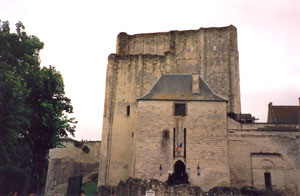
She immediately sent word of her arrival to the castle and craved of the royal goodwill the audience requested by letter. But she had to wait two days before she was allowed to present herself before Charles VII.
First of all, the Dauphin sent for Bertrand de Poulengy and Jean de Metz in the presence of his Grand Council.
He then sent the members of his Council and his notaries to the lodgings of this Maid to question her. « She said that she had two mandates from the King of Heaven, firstly to raise the siege of Orleans, and secondly to escort the King to Reims for his coronation and anointing. »
WHO IS THE TRUE KING OF FRANCE ?
The Dauphin Charles received her on Lætare Sunday, 6 March. And in order to test her, he hid himself in a room located behind the great hall of honour.
Joan entered. Everyone observed her. Her appearance was that of a girl « well-built, and rather strong, beautiful and well formed ». Her whole being radiated both a natural and supernatural beauty.
« She was then presented to Charles de Bourbon, who feigned to be the King. But she said right away that he was not the King, and that she would recognise him if she saw him, even though she had never seen him before. Then an equerry was brought to her pretending to be the King. But she knew that it was not him. » Charles heard the murmurs of admiration from the room where he had taken refuge. Thus, drawn by curiosity, he was keen to take a furtive look in the room. « And shortly afterwards, the king came out of a room and as soon as she saw him, she said that it was he. »
She looked at him, and « made the bows and curtseys customarily made to Kings, as though she had been raised in his court; and, when she had finished her salutations, she addressed the king : “ May God give you long life, noble Dauphin !" Now there were several lords there who were more pompously and richly dressed than the King. That is why he replied to Joan : “ I am not the King, Joan !" And pointing to one of his lords, he said : “ There is the King !" To which she replied : "In God’s Name, noble prince, it is you and no other !" » Knowing not what to say, Charles asked her her name. She answered :
« Noble Dauphin, my name is Joan the Maid. And the King of Heaven informs you by me that you will be anointed and crowned in the city of Reims, and that you will be the lieutenant of the King of Heaven, who is the King of France. »
« Most illustrious Dauphin, I have come, sent by God, to bring aid to you and to the kingdom… Give me men, and I will raise the siege of Orleans. It is God’s pleasure that your enemies, the English, should return to their country and that the kingdom should remain in your hands. And if they do not leave, they will pay dearly for it. »
Charles listened. And now came Heaven’s answer to his most secret prayers : « I tell you, on behalf of My Lord, that you are the true heir of France and son of the King. And He sends me to you so that I may escort you to Reims, where you will receive the crown and the anointing, if you so wish. »
She was addressing him with the familiar “ tu" ! This time, Joan had touched the open wound in the Prince’s soul. The affair was too intimate and could not be continued in public. « Those in attendance were dismissed, and Joan, alone with the King, conversed with him for more than two hours. » Then he declared to his assistants « that Joan had told him certain secrets which none knew or could know other than God. He therefore had great confidence in her. »
From then on, Joan was lodged at the castle. She stayed there three weeks, and was interrogated at length by the most learned theologians and by the Dauphin himself. On Easter Monday, she was sent to Poitiers to be interrogated by the doctors of the University of Paris.
After three weeks, the assembly concluded that could one find in her « nothing but good works, humility, devotion and honesty, and that she should be taken to Orleans to show the sign that she had promised. » And Joan returned to Chinon, where, in sign of her mission, relates the chronicle, she one day performed a symbolic act, in the manner of the prophets of the Old Testament.
She asked the Dauphin « to resign his Kingdom, to renounce it, and to give it back to God from whom he held it ». And to this end, she asked that the royal secretaries be called. The Dauphin accepted. Four of them came and drew up an act of homage, which they solemnly read out, at the request of the young girl.
In this, Joan shows herself to be not only God’s messenger, but the unique mediatrix of France’s deliverance, something unparalled in universal history.
From Chinon, the Dauphin sent her to Tours to be armed and to receive her military household, and from there to Blois to join the contingent created by Queen Yolande to supply Orleans with fresh provisions.
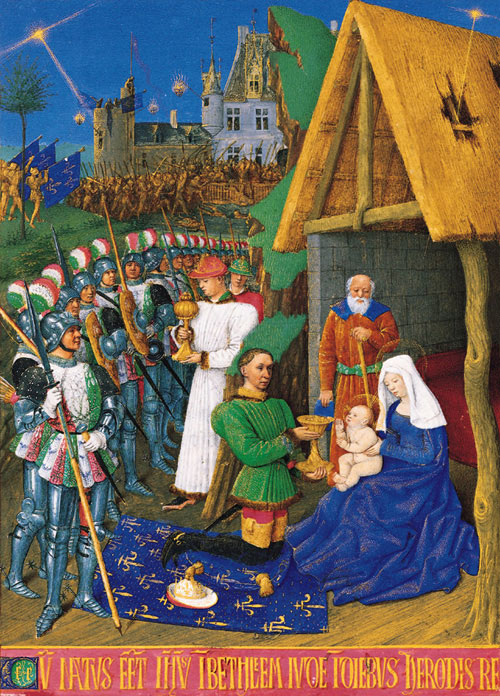
Taken from Resurrection, n°17, May 2002, p. 5-12